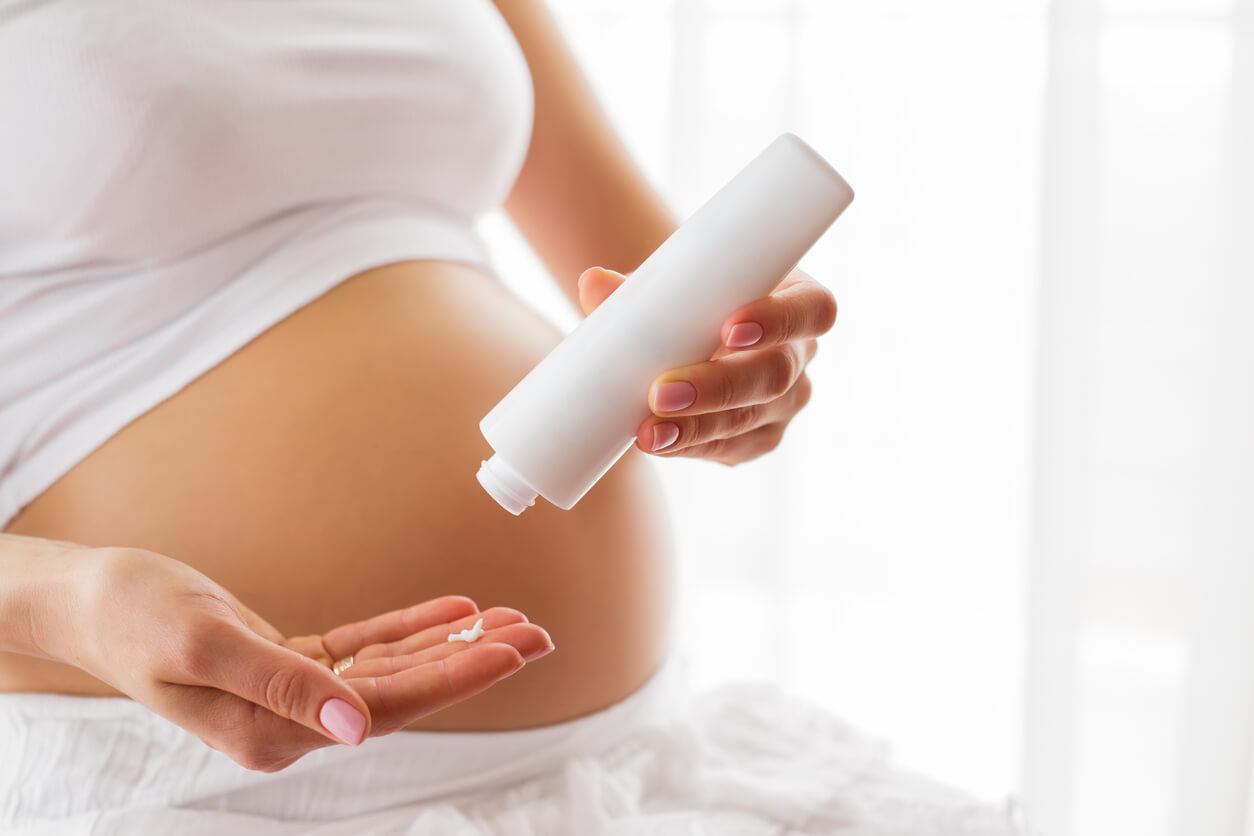10 Keys to Caring for Sensitive Skin in Pregnant Women During Winter


Written and verified by the dermatologist Maria del Carmen Hernandez
The skin in pregnant women during winter requires more care due to its sensitivity. Low temperatures tend to dry the skin’s surface and make it more vulnerable to certain conditions. Also, hormonal changes produce changes that leave it less protected against external factors. In this article, we’ll offer you some tips on how to care for the sensitive skin of pregnant women during winter.
Tips for caring for the sensitive skin of pregnant women during winter
Pregnant women’s skin undergoes significant changes as a result of hormonal changes in their bodies. In addition, the cold and wind further enhance these processes.
Here are some tips for taking care of pregnant women’s skin in winter.
1. Don’t over-exfoliate
Pregnant women’s skin is more sensitive and more prone to developing hyperpigmentation. In addition, the cold and wind during the winter act as aggressive agents against it. Therefore, constant exfoliations, such as peelings with acids, creams with microgranules, or microdermabrasion with diamond tips aren’t recommended.
2. Apply sunscreen
Hyperpigmentation is the most frequent presentation of pregnancy due to hormonal alterations. It even occurs from the first trimester of pregnancy in areas that are already pigmented (nipples, areola, and the genital areas).
Chloasma is observed in 45 to 75% of pregnant women, more frequently in the malar regions or on the forehead.
The use of sunscreen on the face and exposed areas of the body is recommended. In addition, it should be applied every 2 hours for maximum effectiveness.
Read also: 10 Interesting Facts About Your Skin When You’re Pregnant

3. Use cleansing gels daily
Increased sebaceous gland function in the third trimester can lead to acne production and enlarged sebaceous glands in the areola. Therefore, the use of gentle cleansing gels on a daily basis helps to prevent the development of these types of lesions.
4. Use lip moisturizer
Not only the skin tends to dry out in the cold season, but also the lips, which can suffer from dryness, cheilitis, or various lesions. Lip balms are a good option to keep them moisturized. There are even some with sunscreen that can be used daily.
Cocoa or shea butters have vitamins and healthy fatty acids that make them essential for pregnant women’s skin in winter.
5. Moisturize the skin constantly
The skin of pregnant women during the winter tends to dry out even more due to its increased sensitivity. Moisturizing creams with vitamin A, vitamin E, allantoin, and urea are therefore an absolute must. In addition, they contribute to the prevention of stretch marks and keep the skin’s natural protective barrier intact and functional.
You may be interested in: Skin Exfoliation During Pregnancy: Everything You Need to Know
6. Prevent the formation of stretch marks
Stretch marks occur in up to 90 % of women during the sixth and seventh months of pregnancy. These are partial ruptures of the skin’s own structures that appear most frequently on the abdomen, breasts, and thighs.
To prevent their appearance, the use of moisturizing creams is recommended from the first moment of pregnancy. The application should be constant and daily all over the body.
7. Baths with lukewarm water
Showers with very hot water should be avoided because they can cause arterial hypotension, besides drying the skin and sweeping away the protective and natural lipid layer.
Baths should be short and, once finished, it’s best to moisturize the skin with a moisturizing emulsion.

8. Opt for loose-fitting clothes and soft fabrics
Sweating increases in pregnant women, so it’s best to choose loose-fitting clothes that are 100% cotton or made of soft fabrics.
During pregnancy, itching may occur, which is characteristic of this period, influenced by the same dry skin of winter. The choice of clothing contributes to the prevention of these manifestations.
9. Use appropriate soaps
Pregnancy and winter are two factors that tend to produce alterations in the skin, including dryness. Choosing creamy soaps or soaps with a pH close to that of the skin is a good alternative to keep it optimal.
10. Choose hypoallergenic cosmetic products
For care during pregnancy, it’s best to opt for hypoallergenic products containing high-quality active agents to cleanse and nourish the skin. On the other hand, products containing fragrances, alcohol, parabens, colorants, sulfates, or substances that cause reactivity on the skin’s surface should be avoided.
Pregnant women’s skin and winter
Pregnancy is a period in which more than 90% of women experience complex skin changes that can have a major impact. Winter often has a negative influence on it, so certain care and hygiene measures should be implemented, especially at this time.
The skin in pregnant women during winter requires more care due to its sensitivity. Low temperatures tend to dry the skin’s surface and make it more vulnerable to certain conditions. Also, hormonal changes produce changes that leave it less protected against external factors. In this article, we’ll offer you some tips on how to care for the sensitive skin of pregnant women during winter.
Tips for caring for the sensitive skin of pregnant women during winter
Pregnant women’s skin undergoes significant changes as a result of hormonal changes in their bodies. In addition, the cold and wind further enhance these processes.
Here are some tips for taking care of pregnant women’s skin in winter.
1. Don’t over-exfoliate
Pregnant women’s skin is more sensitive and more prone to developing hyperpigmentation. In addition, the cold and wind during the winter act as aggressive agents against it. Therefore, constant exfoliations, such as peelings with acids, creams with microgranules, or microdermabrasion with diamond tips aren’t recommended.
2. Apply sunscreen
Hyperpigmentation is the most frequent presentation of pregnancy due to hormonal alterations. It even occurs from the first trimester of pregnancy in areas that are already pigmented (nipples, areola, and the genital areas).
Chloasma is observed in 45 to 75% of pregnant women, more frequently in the malar regions or on the forehead.
The use of sunscreen on the face and exposed areas of the body is recommended. In addition, it should be applied every 2 hours for maximum effectiveness.
Read also: 10 Interesting Facts About Your Skin When You’re Pregnant

3. Use cleansing gels daily
Increased sebaceous gland function in the third trimester can lead to acne production and enlarged sebaceous glands in the areola. Therefore, the use of gentle cleansing gels on a daily basis helps to prevent the development of these types of lesions.
4. Use lip moisturizer
Not only the skin tends to dry out in the cold season, but also the lips, which can suffer from dryness, cheilitis, or various lesions. Lip balms are a good option to keep them moisturized. There are even some with sunscreen that can be used daily.
Cocoa or shea butters have vitamins and healthy fatty acids that make them essential for pregnant women’s skin in winter.
5. Moisturize the skin constantly
The skin of pregnant women during the winter tends to dry out even more due to its increased sensitivity. Moisturizing creams with vitamin A, vitamin E, allantoin, and urea are therefore an absolute must. In addition, they contribute to the prevention of stretch marks and keep the skin’s natural protective barrier intact and functional.
You may be interested in: Skin Exfoliation During Pregnancy: Everything You Need to Know
6. Prevent the formation of stretch marks
Stretch marks occur in up to 90 % of women during the sixth and seventh months of pregnancy. These are partial ruptures of the skin’s own structures that appear most frequently on the abdomen, breasts, and thighs.
To prevent their appearance, the use of moisturizing creams is recommended from the first moment of pregnancy. The application should be constant and daily all over the body.
7. Baths with lukewarm water
Showers with very hot water should be avoided because they can cause arterial hypotension, besides drying the skin and sweeping away the protective and natural lipid layer.
Baths should be short and, once finished, it’s best to moisturize the skin with a moisturizing emulsion.

8. Opt for loose-fitting clothes and soft fabrics
Sweating increases in pregnant women, so it’s best to choose loose-fitting clothes that are 100% cotton or made of soft fabrics.
During pregnancy, itching may occur, which is characteristic of this period, influenced by the same dry skin of winter. The choice of clothing contributes to the prevention of these manifestations.
9. Use appropriate soaps
Pregnancy and winter are two factors that tend to produce alterations in the skin, including dryness. Choosing creamy soaps or soaps with a pH close to that of the skin is a good alternative to keep it optimal.
10. Choose hypoallergenic cosmetic products
For care during pregnancy, it’s best to opt for hypoallergenic products containing high-quality active agents to cleanse and nourish the skin. On the other hand, products containing fragrances, alcohol, parabens, colorants, sulfates, or substances that cause reactivity on the skin’s surface should be avoided.
Pregnant women’s skin and winter
Pregnancy is a period in which more than 90% of women experience complex skin changes that can have a major impact. Winter often has a negative influence on it, so certain care and hygiene measures should be implemented, especially at this time.
All cited sources were thoroughly reviewed by our team to ensure their quality, reliability, currency, and validity. The bibliography of this article was considered reliable and of academic or scientific accuracy.
- Barankin B, Silver SG, Carruthers A. The skin in pregnancy. J Cutan Med Surg. 2002 May-Jun;6(3):236-40. doi: 10.1177/120347540200600308. Epub 2002 Apr 15. PMID: 11951128.
- Kroumpouzos G, Cohen LM. Dermatoses of pregnancy. J Am Acad Dermatol. 2001 Jul;45(1):1-19; quiz 19-22. doi: 10.1067/mjd.2001.114595. PMID: 11423829.
- Motosko, Catherine C et al. “Physiologic changes of pregnancy: A review of the literature.” International journal of women’s dermatology vol. 3,4 219-224. 21 Oct. 2017, doi:10.1016/j.ijwd.2017.09.003
- Yang CS, Teeple M, Muglia J, Robinson-Bostom L. Inflammatory and glandular skin disease in pregnancy. Clin Dermatol. 2016 May-Jun;34(3):335-43. doi: 10.1016/j.clindermatol.2016.02.005. Epub 2016 Feb 11. PMID: 27265071.
This text is provided for informational purposes only and does not replace consultation with a professional. If in doubt, consult your specialist.








